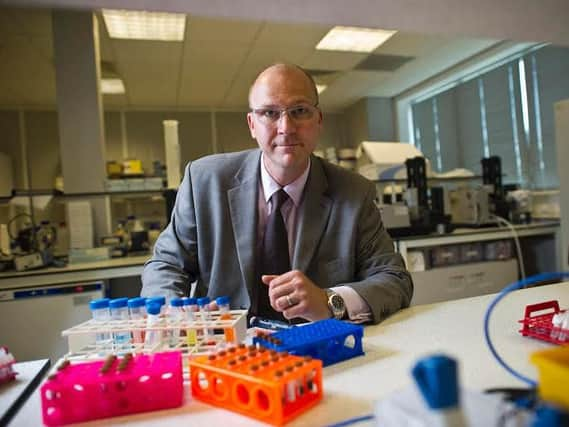Yorkshire drug developer on track for cancer cure


The Wetherby-based firm said it will start human trials in 2020 to help cure people with lung cancer using its ground breaking technology.
The group's CEO Dr Alastair Smith said: "This is a world changing technology that's being developed in the UK. If we have the resources to make the drugs, it could completely change medicine."
Advertisement
Hide AdAdvertisement
Hide AdAvacta's technology is based around Affimers - the firm's high-tech alternative to antibodies.
Antibodies help fight vicious viruses or bacteria in the body by binding to them and targeting them for destruction. The problem with current cancer therapies such as chemotherapy is that they kill off all the cells in their path, not just the cancer cells.
In contrast, Affimers zone in on the cancer cells bypassing the body's healthy cells.
Dr Smith said the Affimer platform addresses markets worth in excess of $100bn where alternatives to antibodies are gaining significant traction.
Advertisement
Hide AdAdvertisement
Hide AdAvacta has high hopes for two of its programmes - PD-L1 and LAG3.
In layman's terms, PD-L1 is a signal that the cancer uses to disguise itself.
"Your own immune system then ignores the cancer," said Dr Smith.
"If you can switch off the signal, your immune system can deal with it. Our PD-L1 inhibitor stops the cancer disguising itself and then the immune system can attack the cancer cells."
LAG3 gives the immune system energy.
Advertisement
Hide AdAdvertisement
Hide Ad"When your immune system is constantly attacking the tumour, it gets tired. LAG3 stops it running out of puff," said Dr Smith.
Over the past six months Avacta has made great strides by combining PD-L1 and LAG3.
"When you combine LAG3 with PD-L1 you get a much more efficacious drug than one of them on their own. We have made huge progress over the last six months," said Dr Smith.
The 10 year delay is a result of the rigorous regulatory processes that Avacta needs to go through before it can offer its technology to cancer sufferers.
Advertisement
Hide AdAdvertisement
Hide Ad"It takes a while to get approval - seven, eight or nine years. That's because of the regulatory process," said Dr Smith.
"We are developing a combination that should be much better than PD-L1."
The plan is to partner a big pharmaceutical company to develop the drugs.
"We are in talks with the big pharmaceutical companies. There is plenty of interest. Adding LAG3 into the mix is getting pharmaceutical companies really interested," said Dr Smith.
Advertisement
Hide AdAdvertisement
Hide AdThe group is on target to conduct a standard, nationwide Phase 1 trial in 2020 which will determine the correct dose for patients.
"People with cancer have written to us asking if we have anything ready to trial. In 2020, we can start helping people."
Dr Smith said the trial will typically include 30 to 50 people with cancer and they will be given a drug that has been fully checked to ensure it is safe with no side effects.
He was speaking as Avacta reported its half year results for the six months to January 31.
Advertisement
Hide AdAdvertisement
Hide AdHalf year revenues rose 16 per cent to £1.5m. Research and development costs increased to £1.5m from £1.3m the year before and the group made a reported loss of £3.9m.
This was expected as Avacta will not make a profit for several years.
The drug development side of the business will hit the big time once Avacta has signed a licence deal with a big pharmaceutical firm. This could be worth between £14m to £28m in an upfront payment, followed by other payments as the drugs roll out.
"I think we will get a licence deal in the next couple of years," said Dr Smith.
Advertisement
Hide AdAdvertisement
Hide AdThe other side of the business is the use of Affimers in diagnostics and this should make a profit in three years time.
"We currently have a £20m market cap and we are not yet in the clinic. We will be in the clinic in 2020 and we could see an improvement to our market cap of between ten and twenty-fold," said Dr Smith.
Analyst Mark Brewer at FinnCap said: "Continued growth in Affimer evaluations (up 50 per cent) and interest from pharma/biotech/diagnostics demonstrates the increasing awareness of its potential capabilities that, we expect, will result in license deals for non-therapeutics applications in the balance of 2018.
"The decision to take a bispecific PD-L1/LAG3-Affimer into the clinic as its lead asset, generating Phase I clinical data in 2020/21, should deliver a considerably more valuable asset for partnering, given licensing precedence in this area. Merck paid €115m for access to a bispecific PD-L1/LAG3 antibody."